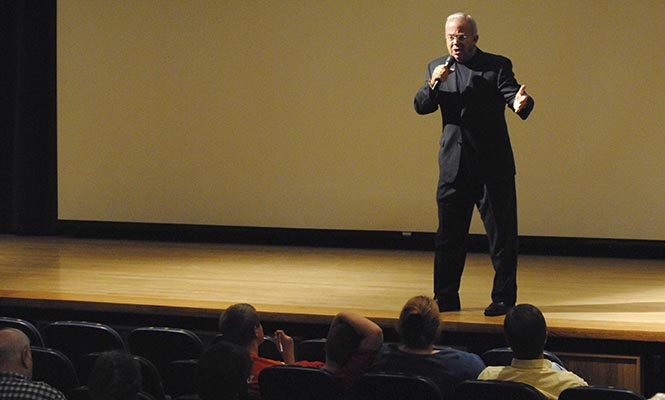Sojourners’ Jim Wallis talks ethics in the 2012 presidential campaign
CEO of Sojourners, a national nonpartisan Christian organization, Jim Wallis, speaks at the KIVA on Thursday, Sept. 13. Wallis’s presentation was titled “The Politically Engaged Believer: Morals, Ethics and Social Justice in the 2012 Election”, drawing a diverse crowd. Photo by Jenna Watson.
The CEO of Sojourners, a nonpartisan Christian organization, told a crowd in the Kiva Thursday evening to follow their moral compasses to affect the winds of social change.
“I believe we should not worry about our religion; we should worry about our moral compass,” Wallis said. “The difference between events and movements is sacrifice. I am still waiting to see where your moral compass is … That is what changes things. When something is important to live your life for, that’s what changes politics. It always has and always will.”
Wallis said he wants people to remember and trust the hope for change they felt four years ago while learning how that change occurs. Wallis described a common sight in Washington, D.C.: politicians with their wet fingers in the air feeling for the direction of the wind.
“Dr. King knew. Gandhi knew,” Wallis said. “You don’t change a nation with wet-fingered politicians. You change the wind and the politicians will adapt to a change in the wind.”
Wallis screened a five-minute trailer for a documentary, “The Line,” focused on the 46.2 million people — 15 percent of the population — living in poverty.
“The Line” will air Oct. 2 on the eve of the first presidential debate. Wallis said this film is an example of a citizen movement focused on the common good that can change politics.
“We should learn the choreography of social change, an outside-inside dance,” Wallis said. “You create pressure on the outside to create change on in the inside. All of the memorable presidencies — Roosevelt, Johnson, Kennedy and Lincoln — all happened because there were movements on the outside pressing and pushing for change on the inside.”
Wallis said young people are living in a post-candidate world. He sees a focus on real people and real issues that affect real lives. Wallis said he believes less focus on parties and candidates is a good thing and will lead to one of two things.
“Money will control everything about politics,” Wallis said. “Senators tell me they have to raise $20,000 a day to win reelection. Or social movements sparked by social media [will change and shape politics] … We are going to see a moral battle between the power of money and the power of movements.”
Adrienne Langan, a senior fashion merchandising major, said she struggled with the battle between religion and politics, but Wallis’ speech provided her with more clarity and an understanding of the resources available regarding religion and politics.
Along with social movements, Wallis said a focus on being our neighbor’s keeper, a faith-based initiative, is a vision that will bring our country back to the common good.
“I think this whole notion of who is our neighbor and how we begin to treat our neighbor as ourselves is the way forward in politics,” Wallis said. “It comes to people, communities and social movements first and to politics last.”
Contact Tyler Singleton at [email protected].



